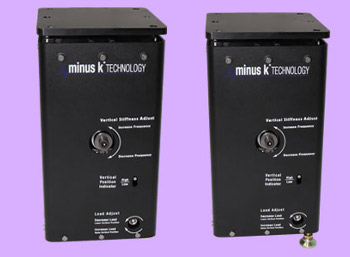Minus K Technology, a leading manufacturer of passive vibration isolation products, has just released a compact, high-capacity, low-frequency negative-stiffness isolator designed to support heavy payloads while reducing low-frequency vibrations.
 LEFT: Low Freq. Horiz, 121mm x 121mm x 203mm, 3.1kg. RIGHT: Ultra Low Freq. Horiz, 121mm x 121mm x 178mm, 3.1kg
LEFT: Low Freq. Horiz, 121mm x 121mm x 203mm, 3.1kg. RIGHT: Ultra Low Freq. Horiz, 121mm x 121mm x 178mm, 3.1kg
The new LC-4 isolator comes in several capacity ranges to match vibration-sensitive instruments such as SPMs (AFMs, STMs, etc), micro-hardness testers, profilers, interferometers, electron microscopes, or other imaging systems, for weight loads from 1 to 130 lbs.
The LC-4 comes in two versions (Low Freq. Horiz and Ultra Low freq. Horiz.). Both can deliver a vertical natural frequency of 1/2 Hz or less, which can be achieved over the entire load range. Horizontal natural frequency is load dependent. The Low Freq. version has a 1 1/2 Hz natural frequency, while the Ultra Low version can achieve 1/2 Hz or less near the nominal loads.
As with all Minus K isolators, the LC-4 is completely passive, using no air or electricity. The new isolators can be combined into multi-isolator systems to support heavier payloads while taking up very little room themselves. The LC-4 isolators can be placed inside OEM equipment as needed enabling the systems to achieve much better isolation.
If needed, the LC-4 isolators can be customized to achieve user-specific needs. For example, different horizontal and vertical frequencies, damping, etc. They can also be made cleanroom or vacuum compatible.
About Minus K Technology, Inc.
Minus K® Technology, Inc. was founded in 1993 to design, manufacture and market state-of-the-art vibration isolation products based on the company’s patented negative-stiffness-mechanism technology. Minus K products are used in a broad spectrum of applications including nanotechnology, biological sciences, semiconductors, materials research, zerog simulation of spacecraft, and high-end audio. The company is an OEM supplier to leading manufacturers of scanning probe microscopes, micro-hardness testers and other vibration-sensitive instruments and equipment. Minus K customers include private companies and more than 300 leading universities and government laboratories in 48 countries.